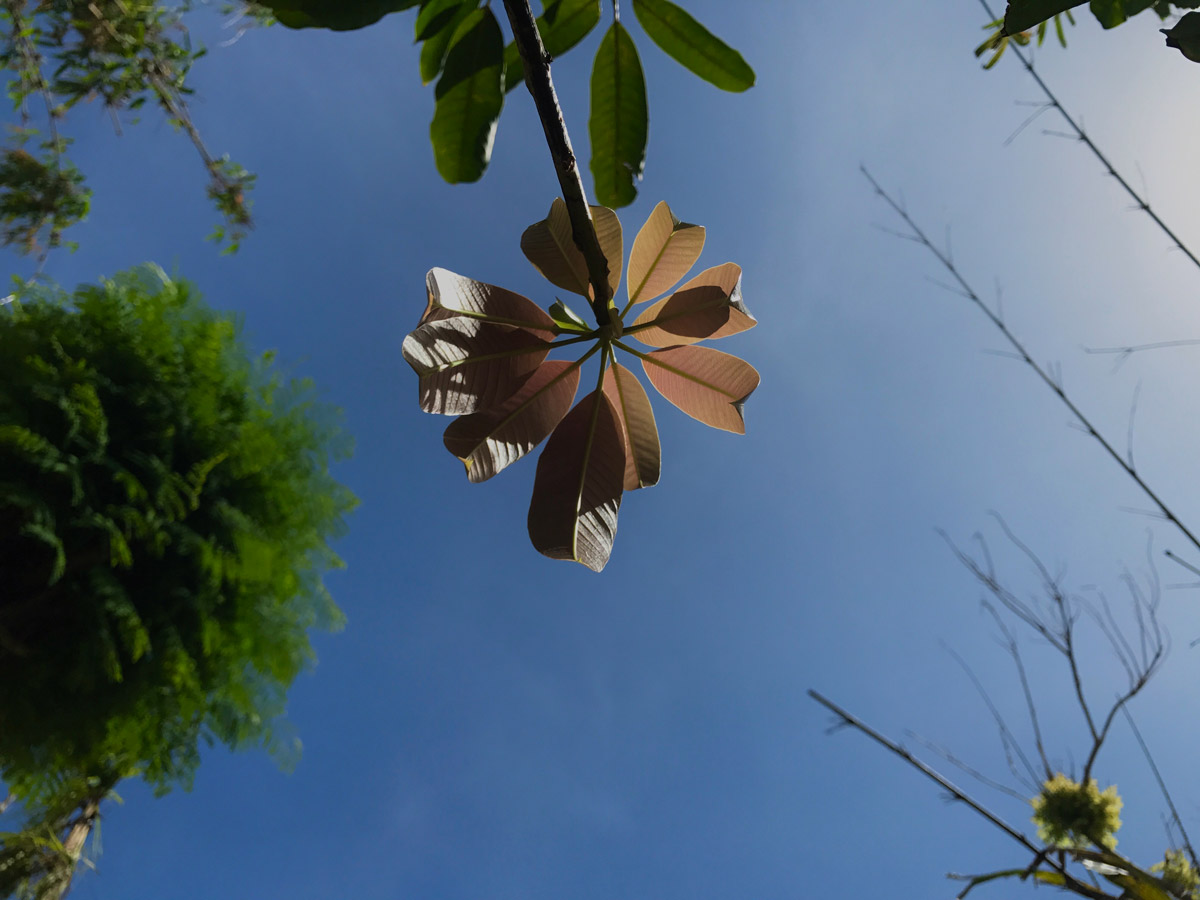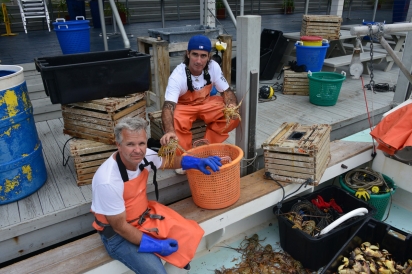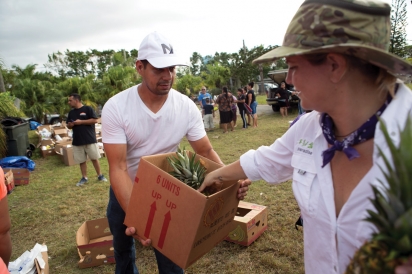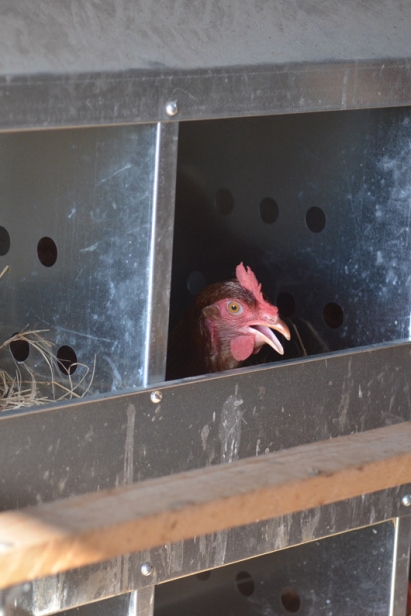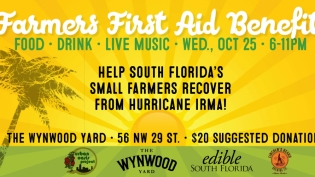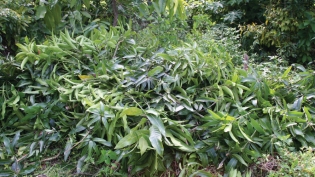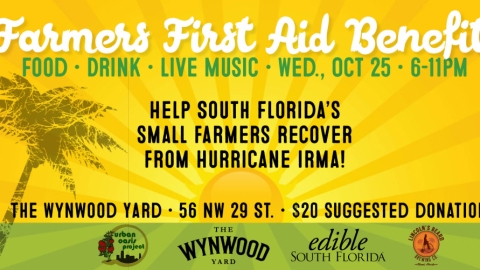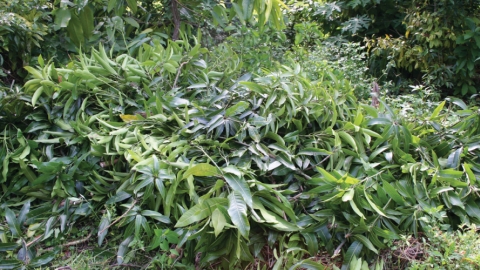After Hurricane Irma
Fewer avocados and grapefruits. Higher prices. Citrus from Mexico. Lost jobs. Crippled businesses. While the damage from Hurricane Irma was greatest in the Florida Keys, all of South Florida will feel its impact in the months ahead.
Local Food
Fallen trees mean fewer local fruits in the months ahead, especially avocados, typically in production from May until January. “There will be little to no local avocados the remainder of the year,” says Jorge Abreu, executive director of the Dade County Farm Bureau. “Many of the larger trees were blown over or the branches snapped and it will take up to three years to get those back in full production.” Guava was knocked off the trees so there will be a few months with low supply. Mature untrimmed mango, lychee and longan trees were damaged and will take some time for recovery. Local row crops – squash, beans, tomatoes and okra, along with sweet corn – are a couple of weeks behind schedule. Abreu says he expects to see imports in the market and higher prices.
Citrus growers in central Florida took a big hit, says Nick Bernal of Seasons Farm Fresh. “Grapefruit will be in short supply and prices will be high.”
In the lower Florida Keys – Marathon, Big Pine and Cudjoe in particular – Irma’s impact was dramatic. For commercial fishermen, especially in the Keys, the storm damaged or destroyed boats and lobster traps. Fixing vessels and rebuilding traps sidelined fishermen for a few weeks, says Paul Menta, co-founder of Three Hands Fish in Key West. But by Sept. 22, “we already had a number of our fishermen back on the water, bringing in their daily hauls of yellowtail snapper and lobster,” he says. Stone crab season begins Oct. 15.
Longtime Cudjoe Key restaurant The Square Grouper is planning to open in October, says owner Lynn Bell. “Come and visit and come often because we need our visitors to love and support us during our rebuild.” At Mike’s Smoked Fish & Dip in Marathon, featured in our spring issue, Mike and Debora Jennings’ commercial kitchen is still standing, but the 22-cubic-ft freezer floated away in the surge. They launched a gofundme.com fundraiser to help rebuild their business.
Farmworkers
For many farmworkers in South Miami-Dade, the storm left them without power and without work, wiping out much of the okra and avocado crops typically harvested. Relief efforts included a drive by Paradise Farms’ Karla Dascal and Gingi Beltran, in partnership with Sachamama, a nonprofit. They raised over $25,000 for migrant farmers and gave nearly 250 families a hot meal and relief packages containing fresh fruit, bread, cereal and household products, along with water and ice.
Many of South Florida’s farmworkers were left without work because of flattened okra fields. In Florida City, Centro Campesino and Catalyst Miami partnered to help the community, processing applications for food stamps, FEMA disaster relief and unemployment.
Want to help?
Centro Campesino 305-245-7738
Farmworkers Assn. of Florida 305-247-0072
We Count 305-247-2202
RCMA The Florida Specialty Crop Foundation and the Florida Fruit & Vegetable Association are raising funds to help the Redlands Christian Migrant Association Farmworkers provide immediate essentials for farmworkers. Donate here.
Places
Fruit and Spice Park, Redland
“The greenhouses lost their skins but all the buildings and infrastructure were spared," says Jim Stribling. "We are already seeing the stress of the storm cause extra-seasonal bloom and foliar flush on some species, so we will be watching for some unusual but welcome responses from the trees.” The Seafood Fest and Fish Fry Nov. 18-19 is on.
Want to help? redlandfruitandspice.com
Miami Beach Botanical Garden
“We have righted almost all of the fallen trees, cleared at least a ton of debris and continue to clean and clear each corner of our tropical oasis. I have learnt lessons from Irma, mostly about preventive pruning!" says Sandy Shapiro. "Regrettably we lost our beautiful fish when the power went out and our acacia tree tipped into the pond. Today the ponds are clear and the trees are lifted. The birds have returned and the butterflies are starting to reappear.”
Want to help? mbgarden.org/support/donate
Grimal Grove, Big Pine Key
“For the first time in 60 years we got storm surge. Luckily, the salt water didn’t stay. We’ve been propping up trees, trying to get water to them. Most of the big trees stayed up. The rarest trees took the biggest hit," says Patrick Garvey. "The store was decimated. We are closing temporarily the distribution and markets. We’re going to try our best to rebuild and replant. We’re also trying to source rare trees to plant at the grove.”
Want to help? Donate or volunteer growinghopeinitiative.org
Vizcaya, Miami
Hurricane-force winds tore off the lattice roof of the Tea House and uprooted trees, while the storm surge toppled statues and other stone work on the Barge and Boat Landing. “The gardens were inundated with up to six feet of salt water and then covered with several tons of sea grass, muck and other debris after the storm surge receded,” says Charlotte Donn. They reopened Oct. 2.
Want to help? Donate online at vizcaya.org. Their Halloween Sundowner Oct. 28 raises funds for the preservation of Vizcaya: vizcayahalloween.org
Deering Estate, Cutler Bay
Historic buildings fared well, with minimal damage, and the heritage avocado and mango groves are overall in good condition. About 6,000 cubic yards of seaweed washed ashore and will be redistributed to other parts of the estate and reused as rich soil.
Want to help? deeringestate.org
Rare Fruit and Vegetable Council of Broward, Southwest Ranches
“The majority of our specimen fruit tree collection sustained much damage,” says Karim Rossy. Vegetable bed preparation will be delayed and their fall sale is postponed.
Want to help? Visit their Facebook page. They hope to participate in the Bonnet House Orchid Festival and Exotic Plant Sale Dec. 2-3: bonnethouse.org/event/bonnet-house-orchid-festival.
The Education Fund Food Forests
All 16 food forests had downed trees, limbs and debris, and windblown plants. “Banana plants were hit the hardest,” says Debi LaBelle. Bushes such as moringa, chaya and edible hibiscus fell over and also need to be cut back and staked. Cranberry hibiscus, basil, and other spinach/herbs were windblown and lost all their leaves. We are going to encourage schools to plant their kale, collards, tomatoes, carrots and such to fill in the gaps and give the perennials a chance to regrow.”
Want to help? educationfund.org
Farms
The Florida Farm Bureau has announced a statewide Hurricane Irma Relief Fund for agriculture. Florida Farm Bureau Women’s Fund is accepting tax-deductible donations here.
Harpke Family Farms, Dania Beach
harpkefamilyfarms.com
Claire Hutin says they encourage would-be CSA members to sign-up for their shares sooner than later, "because we could certainly use the working capital immediately. Our microgreen-only CSA program runs year-round and our salad CSA (lettuces, micros and tomatoes) program will begin in November."
Sun Fresh Farm, Davie
getsunfresh.com
Hens were secured in vented shipping containers and given mounds of hay, extra water and food. “We lost some birds, presumably from stress,” says Barb Tolbert. “We also lost two acres of ready-to-harvest salad greens and field seedlings.”
Cerasee Farm, Miami
urbangreenworks.org
Their Liberty City property lost most of their large fruit trees, papayas and beehives. “But smaller fruit trees held up or were slightly uprooted,” says James Jiler. “Our school garden at Northwestern had many trees uprooted, but we replanted and straightened most of them." Volunteers and plant donations are welcome.
Grow2Heal Garden, Homestead Hospital
baptisthealth.net
The garden structures survived minus the plastic on the greenhouse, and so did the beehive, says Thi Squire. “We did have a lot of flooding, however. Planting is a bit behind schedule.”
Bee Heaven Farm, Homestead
beeheavenfarm.com
Margie Pikarsky reports damage to greenhouses. While she cancelled GrowFest, she is planning to hold plant sales on the farm later in the fall.
Mr. Green Dean, Dean Richardson
Mr. Green Dean on Facebook
”I still have French sorrel, garlic chives, katuk, Egyptian spinach, a small amount of Chinese kale, and a few odds and ends. I also have a new crop of Burgundy okra. All of our hoop houses and greenhouses were destroyed.” Rebuilding the nursery is a priority, so he expects it will probably be early November instead of two months earlier before he starts planting for fall.


